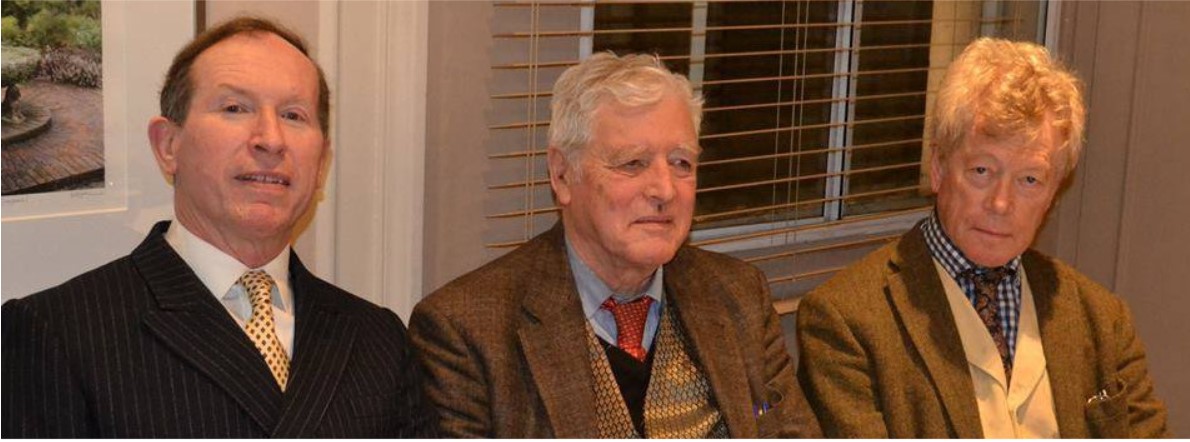Gregory Lauder-Frost is a well-known personality in the movement known as “High Tory,” the right-wing conservatives who previously had great influence in the Conservative Party, but who now identify the party as a fraud that has surrendered to the Left ever since the post-war era began. Lauder-Frost was a member of the Tories’ right wing for 20 years, and then featured in the legendary Conservative Monday Club, an independent conservative group that wanted to defend the Tories’ conservative roots and ideals. Since the group dissolved in the early 2000s, he founded the Traditional Britain Group and today claims to be persona non grata in his old party.
“The Conservative party moved away from conservatism, and I stood still. That’s what the situation looks like,” he says when Nya Tider reaches him on the phone. “The Traditional Britain Group stands for the same things that the Conservative Monday Club stood for. And the Monday Club had 10,000 members, including 35 parliamentarians. The Traditional Britain Group has 600 members and no parliamentarians. People are so scared today. They worry that their membership might leak out in public. The old Conservatives were prepared to stand for what they thought. Today, all of them would no doubt be condemned as racists and fascists.”
His criticism of the Tory Party is also recognized in other countries, where conservatives have seen their parties adapt to the 68-Left rules of the game and thus abandon their conservative profile.
“There is nothing conservative about the Conservative Party, other than the label. All parties in the UK are left. True conservatism now exists only outside party politics,” he says, and just mentions his late friend Roger Scruton’s important contributions.

Roger Scruton is dead. After his death, he was hailed by Britain’s Prime Minister Boris Johnson as the greatest conservative thinker of modern times. Photo: Wikimedia / SlimVirgin
“Roger Scruton was a national star. He was, and remains, Britain’s leading conservative philosopher in modern times. We have had Michael Oakshotte and a few others, but nobody even comes close to Roger. He’s a bit like Enoch Powell. The establishment hated him, but when his memorial ceremony was held at Westminster Abbey, it was packed and most were left standing for lack of seats. All his critics, all the hypocrites of the establishment were suddenly there: ‘Oh, poor Enoch! Enoch is dead!’. If they held a memorial ceremony for Roger, I can guarantee it will be the same. They are both celebrated posthumously.”
Gregory Lauder-Frost got to know Roger in the 1980s at Birkbeck College at the University of London. Scruton was a professor, Lauder-Frost a substitute who went to listen to Scruton’s lectures in philosophy of his own accord.
“I got to know him early. I always went and listened to his lectures. And I’ve always kept in touch with him. Even when I was finished at university, I made sure to always go and listen if he gave a public lecture in London.”
Scruton was forced out of the British academy after a book in the 1980s that criticized the Left’s march into the universities. He moved to the United States instead.
“We didn’t meet for twenty years, but we kept in touch. A few years ago, when he moved back to England, I wrote to him asking if he wanted to lecture for the Traditional Britain Group. I was honest and said that I am persona non grata among the mainstream pseudo-conservatives, and that he risked being criticized for participating.
“Roger replied that it didn’t worry him the least. ‘You will never be persona non grata to me, Gregory. Now we just have to find a suitable date,’ he wrote.”
Lauder-Frost also reports that Roger had responded with a handwritten letter. “His answer came immediately. He replied with a handwritten letter. He also wrote that he was surprised that I had emailed and not written a regular letter. I immediately felt too modern and of course responded with a handwritten letter back,” laughs Lauder-Frost when he thinks back on the event.

Gregory-Lauder Frost is the founder of the Traditional Britain Group and friend of Roger. He says that Roger was a good person who had the ability to give other conservatives hope in a society where conservatism has been in decline for 70 years. Photo: Private
Lauder-Frost believes that Roger Scruton with his participation showed that he had solidarity with genuine conservatives.
“Solidarity is something beautiful. Roger had solidarity with genuine conservatives. He acknowledged genuine conservatives, whom the Left always calls ‘fascists’. He understood what true conservatism really means, and so he spoke to us.”
“Another thing was with Jacob Rees-Mogg. He gave a critical speech that no one liked. When the media grilled him after he spoke to us, he immediately turned away and took off. He didn’t have the backbone Roger had at all. Rees-Mogg is a careerist and a knife.”
Scruton’s attendance was a success.
“The room was full. Many even had to stand. He had an ability that others do not have. His visions of conservatism were like a bright light that finally penetrated the darkness. We have no party that is conservative. We have no party that has done anything conservative since World War II. There is no conservative influence in British politics. Everything is left, on a sliding scale. But Roger was there, and he wrote his books – a countless number. And he not only dealt with politics but also architecture, art, sculpture and much more.
“We conservatives in today’s society are like people walking in a desert. We die of thirst, because there is no water. Then Roger was the water we so desperately needed. ‘I’m here to give you hope,’ and he really gave us hope.”
Lauder-Frost intimates that he has read Scruton’s books his entire adult life and that it is difficult to choose just one favorite book.
“I have about 20 books of his. I like his book on beauty (Beauty, 2009), How to be a conservative (2014) and The Uses of Pessimism: And the Danger of False Hope (2010).”
Lauder-Frost says that Scruton primarily wanted to defend conservatism, but that he did, after all, also enter into the immigration debate sometimes, especially in the autumn.
“Roger was first and foremost an old-fashioned conservative. He touched on immigration, even though he was never involved in the issue like the rest of us. However, he stated that he saw it as difficult for someone who is not an Englishman to become one, because we have a multi-thousand-year heritage, history and culture. It becomes difficult for a foreigner to feel a sense of belonging in relation to such a tradition.
The interview that got Roger fired
It would be a controversial interview about, among other things, immigration that Scruton’s last days was associated with. The interview will remain discussed for a long time to come.
Scruton had undergone an interview with young journalist George Eaton from the leftist New Statesman. When the interview was published, an outcry broke out. Lauder-Frost talks about the turbulence surrounding it.
“Leftist character assassinations kill everyone who belongs to the traditional right, even geniuses like Roger. They are unable to argue in substance, so instead they attack the individuals with slander, insults and insinuations. No wonder Roger’s health was failing.
“What the Left does is that they look up everything you’ve ever said in your entire life and eventually they find something and exclaim ‘Look, he said this!’, Even if it’s long ago or taken completely out of context. They are vomit,” says Lauder-Frost.
Scruton was alleged to have expressed “anti-Semitic” and “racist” views. At the same time, Eaton tweeted loose quotes from Scruton, which only escalated the situation. Eaton argued that Scruton not only attacked Jews but also Muslims and Chinese. Immediately the campaign went into all media, and now he was being attacked not only by leftist politicians but also by a number of prominent parliamentarians and party leaders among conservative Tories, whom Lauder-Frost calls “fake conservatives”.
Scruton, known for his defense of classical architecture, was fired within a few hours from his unpaid role as chairman of the Tory government’s architectural policy project “Building Better, Building Beautiful”. The decision was made by Minister James Brokenshire without even contacting Scruton.
The journalist who wrote the article celebrated. He posted a picture on his instagram account drinking from a champagne bottle with the text: “The feeling when you get right-wing racist and homophobe Roger Scruton sacked as a Tory government adviser”. Later he deleted the image.

Journalist George Eaton from the left-wing New Statesman celebrated with champagne after an interview that led to Roger being fired as an adviser to the Tory government. Later it turned out that the article was deliberately manipulated and that Roger’s quotes were taken completely out of context. Photo: Twitter
“Roger was too kind, yes almost a little naive at times,” says Lauder-Frost. “Sometimes he saw the dangers, but sometimes not at all. I think he should have refused to do the interview. It was pure madness. George Eaton is a douchebag who does “hit jobs” on people like us. Roger was good, and many good people have problems with bad people. They believe that there is goodness in everyone, they think someone is innocent until the contrary is proven and are always ready to give them a chance. I have a different attitude. Some people have no good in themselves. They are just evil. I say, ‘You are a socialist, so you are red, and so you are the enemy and will always be.’ And I’ve never had any reason to rethink that attitude.”
When the entire establishment in unison bought Eaton’s story and took part in the campaign that caused Scruton to be kicked out, and then continued on as usual, there was a journalist who had an eye for owls in the moss and decided to dig further. It was conservative immigration critic Douglas Murray at The Spectator, a conservative arch rival to the left-liberal New Statesman. To Murray’s question, the New Statesman responded that the interview was recorded in its entirety. Murray then asked to get the entire interview out and started the hashtag #ReleaseTheTape, but he was denied access to the recording time and time again.
In the end, Murray managed to get a copy of the recording and was able to listen to the entire interview. Even today, it is a mystery how Murray managed to get hold of the recording. Scruton did not record the interview. The only recording was done by Eaton. There is speculation that someone on the New Statesman managed to get hold of Eaton’s recording and then sent it to Murray.
“It was not at all as bad as I thought [for Roger]: it was significantly worse for Sir Roger’s assailant [journalist Eaton],” Murray wrote in an article in The Spectator.
The entire material was published, and it became clear that quotes were lifted completely out of context and that the interview was deliberately angled to portray Scruton as racist and anti-Semitic. Important quotes that proved that this was not the case had been omitted.
Scruton’s alleged anti-Semitic quotes were as follows: “Anyone who does not believe that the Soros Empire is active in Hungary has not observed the facts.”
But the newspaper had omitted the next sentence: “It’s not necessarily about a Jewish empire, that’s just nonsense.” In the interview, Scruton had also acknowledged that anti-Semitism exists in Hungarian society and distanced himself from it.
The magazine now apologized and acknowledged that Scruton’s views had been distorted.
“We apologize for what happened and regret the problems this has posed to Sir Roger,” Eaton’s magazine wrote, eventually agreeing to publish the entire interview.
Some rehabilitation — but the damage was already done
The question of the Conservative Party’s firing of Scruton was made an issue by Boris Johnson ahead of the Tories’ party leadership election in July. Johnson, who had left Theresa May’s government in 2018 in protest against the weak handling of Brexit, now also sharply criticized the handling of Scruton. May had not wanted to comment on the case personally, but the government spokesman had stated that Scruton’s comments were “deeply offensive and totally unacceptable” and “disturb the important work the government wants to do”. Johnson said that Scruton was exposed to a witch hunt and that his party had folded immediately.
Scruton was re-elected as chair of the architecture group in July 2019 together with Boris Johnson winning the election. But despite this symbolic victory, it was clear that his reputation had changed forever. The media attack against Scruton had done more harm than the attempt at rehabilitation could repair.
“Although he regained his position, the fact remains that the Left told everyone that he was a racist. In England we have a saying: ‘Mud sticks’, and that’s just it. If you don’t have hundreds of thousands of pounds to sue these vomits, the lies will remain forever on the internet,” says Lauder-Frost, and ruthlessly criticizes the media.
“Our biggest enemy is the media, and the media is controlled by the Left. They affect millions and millions again through television and newspapers. The damage was done. The correction is given so little space that it is barely noticeable at all.”
The tough time for Scruton was not over. That same summer, Scruton announced that he had suffered from cancer. He told me that he had been practically dying, but that he had survived after starting treatment with a rheumatologist. A few days before Christmas 2019, when death was imminent, he told The Spectator about the difficult time and the feeling of having lost almost everything. Despite this, he expressed no anger, but only deep gratitude to those who helped him.
“This year I was deprived of a lot – my reputation, my status as an intellectual, my position in the Conservative Party and its movement, my peace of mind, my health. But I got so much more back, by Douglas Murray who so generously defended me, by all the friends who joined him, by the rheumatologist who saved my life and by the doctor whose care I now depend on. I fell to the bottom of my own country, but was lifted to the heights elsewhere. When I look back on the course of events, I am glad that I have lived long enough to be involved in all this. As you approach death, you begin to realize what life means, and what it means is gratitude. ”
Lauder-Frost thinks that one should not attach too much importance to the fact that when he was dying, Scruton stated that he had lost most of it.
“I don’t think he lost his reputation. Sure, it hurt in the end, but you always have to keep fighting. The older you get, the smaller your will. Roger was ill and could not fight anymore. But I am convinced that Roger will be remembered all over the world as the leading philosopher of his time. They may call him racist or whatever, but you can never take away from him his tremendous work and the fact that he was constantly invited to speak for conservatives all over the world. He died with his good reputation intact, I think.”
Roger Scruton fell asleep in his home on January 12. After announcing his departure, he was hailed by Britain’s Prime Minister Boris Johnson:
“Rest in peace Roger Scruton. We have lost the greatest conservative thinker in modern times – who not only had the courage to say what he thought, but also said it beautifully.”










